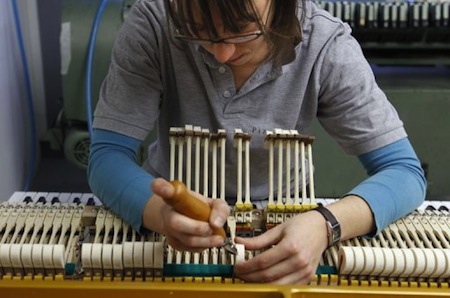AFP
Dec 9, 2010
World's oldest piano maker tunes in to designer furniture
AFP
Dec 9, 2010
PARIS, Dec 9, 2010 (AFP) - Once the favourite of Chopin and Debussy, the world's oldest piano maker, Pleyel, has been hard hit by competition from Asia -- so to adapt the firm is venturing into new territory: designer furniture.
 An employee of Pleyel piano manufacturers works on a piano assembly line in Paris / Photo : AFP |
Founded at the turn of the 19th century, Pleyel is now a niche player, producing just 25 grand pianos a year -- down from 1,700 a decade ago -- but it still holds 200 years of expertise in fine marquetry and luxury woodworking.
The smell of varnish fills the air as cutting and pressing machines hum and pump in Pleyel's factory in Saint Denis, outside the French capital, and skilled hands sand and put finishing touches to the models.
"In this factory we have 15 people doing 20 different jobs. Many cabinet makers, lacquer and varnishing experts, a lot of know-how that we use to make instruments," Arnaud Marion, artistic director at Pleyel, told AFP.
"And we realised we had reached such a high level of expertise in these fields, that it seemed a good idea to use it to make pieces of high-class furniture."
To make its mark, Pleyel has enlisted the help of top French and international designers such as Italian star Michele de Lucchi -- who worked on a metal display case that would go sit nicely next to a grand.
And of course he also designed the piano itself -- a steep learning curve for someone who doesn't play.
"It's an adventure, a surprising opportunity that life presented me with, because I'd never thought of designing a piano," De Lucchi told AFP during a trip to Saint Denis to unveil a life-sized prototype of the instrument.
"Bit by bit I discovered what you can't change when you make a piano, and what are the details that can be modified," said the long-bearded designer, inspecting the solid wood model.
Before teaming up with De Lucchi, the manufacturer first asked a US designer, Hilton McConnico, to design a piano-shaped sofa dubbed "Pleyel" for it several years back, which it started producing this year on demand.
Looking ahead, it has asked five French designers -- Patrick Jouin, Olivier Gagnere, Bruno Moinard, Patrick Noguet and Noe Duchaufour-Lawrance -- to create a high-end furniture line to be presented at the Milan fair in 2012.
"It's a logical next step," said Marion, pointing at Pleyel's long history of working with designers on its pianos -- from Art Deco pioneer Emile-Jacques Ruhlmann in the 1930s to the French diva Andree Putman.
De Lucchi's case and piano will go on display at the Milan furniture fair in April next year.
His grand has a price tag of 100,000 euros (132,000 dollars), the cost of a high-end sports car, and Pleyel's other furniture items are priced well out of the reach of most pockets -- which is part of an intentional branding drive.
"Our idea was not to enter the mass market, for example with ordinary tables or couches, but to create unique objects for collectors," said Marion.
Faced with Chinese and South Korean competitors who can crank out a piano for as little as 2,000 euros, and who sell 80 percent of the world's pianos, Pleyel has turned its business model around in the past decade.
In 2007, the firm left its base in Ales in France's southern Gard region to return to Saint Denis -- where it had been based for a century from 1865 -- and started cutting back on production and diversifying.
"This is both an artistic and industrial move. We want to get out of the niche of music to move into 'art de vivre'," Marion said.
Will Steinway one day make wardrobes and Boesendorfer bookshelves? It's a bit of a leap, but Pleyel might just be rewriting the score for diversification in the piano industry.by Jurgen Hecker
Copyright © 2024 AFP. All rights reserved. All information displayed in this section (dispatches, photographs, logos) are protected by intellectual property rights owned by Agence France-Presse. As a consequence you may not copy, reproduce, modify, transmit, publish, display or in any way commercially exploit any of the contents of this section without the prior written consent of Agence France-Presses.

























